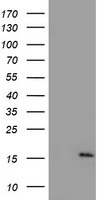NDUFA5 Mouse Monoclonal Antibody [Clone ID: OTI1E8]
CAT#: TA503881
NDUFA5 mouse monoclonal antibody, clone OTI1E8 (formerly 1E8)
Size: 30 ul
Formulation: Carrier Free
Specifications
| Product Data | |
| Clone Name | OTI1E8 |
| Applications | IF, WB |
| Recommended Dilution | WB 1:2000, IF 1:100 |
| Reactivities | Human |
| Host | Mouse |
| Isotype | IgG1 |
| Clonality | Monoclonal |
| Immunogen | Human recombinant protein fragment corresponding to amino acids 3-116 of human NDUFA5(NP_004991) produced in HEK293T cell. |
| Formulation | PBS (PH 7.3) containing 1% BSA, 50% glycerol and 0.02% sodium azide. |
| Concentration | 0.47 mg/ml |
| Purification | Purified from mouse ascites fluids or tissue culture supernatant by affinity chromatography (protein A/G) |
| Conjugation | Unconjugated |
| Storage | Store at -20°C as received. |
| Stability | Stable for 12 months from date of receipt. |
| Predicted Protein Size | 13.3 kDa |
| Gene Name | NADH:ubiquinone oxidoreductase subunit A5 |
| Database Link | |
| Background | The human NDUFA5 gene codes for the B13 subunit of complex I of the respiratory chain, which transfers electrons from NADH to ubiquinone. The high degree of conservation of NDUFA5 extending to plants and fungi indicates its functional significance in the enzyme complex. The protein localizes to the inner mitochondrial membrane as part of the 7 component-containing, water soluble 'iron-sulfur protein' (IP) fraction of complex I, although its specific role is unknown. It is assumed to undergo post-translational removal of the initiator methionine and N-acetylation of the next amino acid. The predicted secondary structure is primarily alpha helix, but the carboxy-terminal half of the protein has high potential to adopt a coiled-coil form. The amino-terminal part contains a putative beta sheet rich in hydrophobic amino acids that may serve as mitochondrial import signal. Related pseudogenes have also been identified on four other chromosomes. [provided by RefSeq] |
| Synonyms | B13; CI-13kB; CI-13KD-B; NUFM; UQOR13 |
| Reference Data | |
| Protein Pathways | Alzheimer's disease, Huntington's disease, Metabolic pathways, Oxidative phosphorylation, Parkinson's disease |
Documents
| Product Manuals |
| FAQs |
| SDS |
Resources
| Antibody Resources |
{0} Product Review(s)
Be the first one to submit a review






























































































































































































































































 Germany
Germany
 Japan
Japan
 United Kingdom
United Kingdom
 China
China






